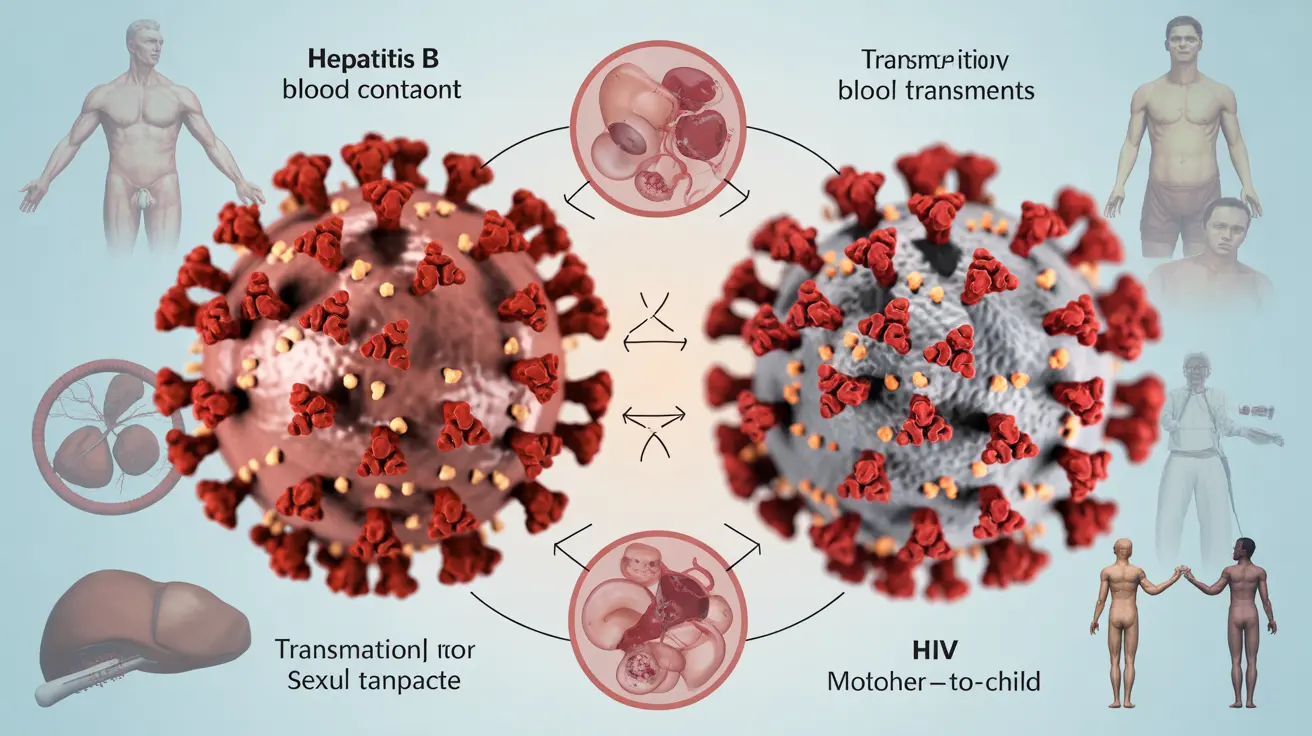Understanding the differences between hepatitis B and HIV is crucial for public health awareness and prevention strategies. While both are serious viral infections that can affect the body in different ways, they have distinct characteristics in terms of transmission, treatment options, and long-term health impacts.
This comprehensive guide explores the key differences between these two viral infections, including their contagiousness, transmission methods, and available preventive measures.
Transmission and Contagiousness
Hepatitis B is significantly more contagious than HIV, primarily due to its ability to survive outside the body for longer periods and its higher concentration in infected blood. The hepatitis B virus can remain infectious on surfaces for up to seven days, while HIV becomes inactive shortly after exposure to air.
Both viruses can be transmitted through:
- Sexual contact
- Sharing needles
- Mother-to-child transmission
- Contact with infected blood
Unique Characteristics of Hepatitis B Transmission
Hepatitis B can spread through seemingly minimal contact with infected blood or bodily fluids. Even sharing personal items like toothbrushes or razors can potentially transmit the virus, making it more easily transmissible in household settings compared to HIV.
Long-Term Health Impacts
Untreated Hepatitis B
When left untreated, chronic hepatitis B can lead to:
- Liver cirrhosis
- Liver cancer
- Liver failure
- Portal hypertension
- Increased risk of liver-related complications
Untreated HIV
Untreated HIV progression typically involves:
- Weakened immune system
- Increased susceptibility to opportunistic infections
- Development of AIDS
- Multiple organ system complications
- Higher risk of certain cancers
Coinfection Considerations
When someone has both hepatitis B and HIV (coinfection), the situation requires special medical attention. HIV can accelerate the progression of liver disease caused by hepatitis B, while hepatitis B can complicate HIV treatment. Regular monitoring and carefully coordinated treatment plans are essential for managing both conditions effectively.
Prevention Strategies
Prevention methods vary between the two viruses, with hepatitis B having more comprehensive protective options:
Hepatitis B Prevention
- Safe and effective vaccine available
- Universal vaccination programs for newborns
- Post-exposure prophylaxis options
- Standard precautions in healthcare settings
HIV Prevention
- Pre-exposure prophylaxis (PrEP)
- Post-exposure prophylaxis (PEP)
- Consistent condom use
- Regular testing
- No vaccine currently available
Frequently Asked Questions
Is hepatitis B more contagious than HIV, and why?
Yes, hepatitis B is more contagious than HIV because it can survive outside the body for longer periods and requires less exposure to infected fluids for transmission. The virus is also present in higher concentrations in infected blood compared to HIV.
How do hepatitis B and HIV spread differently through contact with blood or bodily fluids?
While both viruses spread through blood and bodily fluids, hepatitis B can spread through casual contact with infected items like toothbrushes or razors. HIV requires more direct contact and typically doesn't survive long outside the body, making casual contact transmission extremely rare.
What are the main long-term health risks of untreated hepatitis B compared to untreated HIV?
Untreated hepatitis B primarily affects the liver, potentially leading to cirrhosis and liver cancer. Untreated HIV affects the entire immune system, making the body vulnerable to various infections and cancers, eventually progressing to AIDS.
Can having HIV and hepatitis B at the same time make either disease worse, and what special care is needed?
Yes, coinfection can worsen both conditions. HIV can accelerate liver disease progression, while hepatitis B can complicate HIV treatment. Patients need carefully coordinated treatment plans and regular monitoring of both conditions.
What are the most effective ways to prevent catching hepatitis B or HIV, and is there a vaccine for both?
Hepatitis B has a safe and effective vaccine available, while HIV does not. Both infections can be prevented through safe sex practices, avoiding shared needles, and using universal precautions. HIV prevention also includes options like PrEP, while hepatitis B has both pre- and post-exposure vaccination options.




